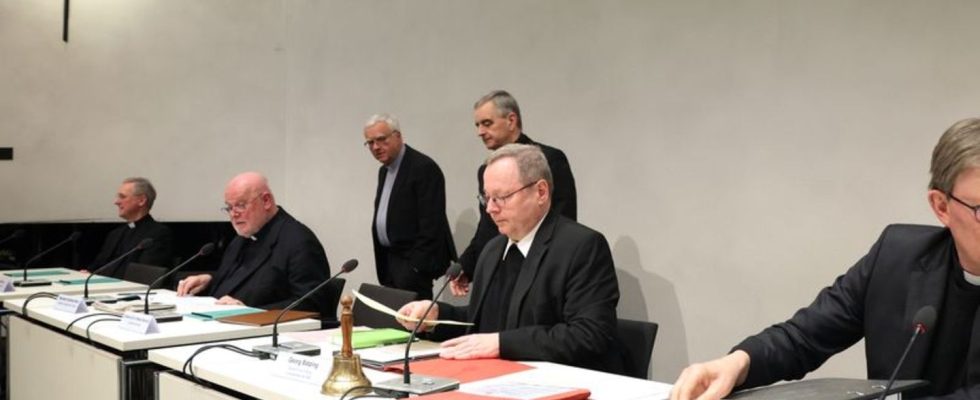Catholic Church
German bishops facing breaking point
The German Bishops’ Conference is looking for a way to deal with the headwind from Rome at its spring conference in Augsburg. photo
© Karl-Josef Hildenbrand/dpa
After the abuse scandal, the German bishops promised reforms – but now they are being rejected by Rome. Should they submit or continue on their path?
After a reprimand from the Vatican, the German bishops are facing an ordeal. Either they oppose it Rome or they bury the plans for a reform committee in which bishops and lay people make decisions on an equal basis, and thereby risk breaking with the Central Committee of German Catholics (ZdK), which represents these same lay people.
At the beginning of the spring general assembly of bishops in Augsburg, the chairman of the German Bishops’ Conference, Georg Bätzing, expressed “astonishment” about the incendiary letter from Rome written by three high-ranking cardinals of the Curia. “Now we have to talk,” demanded the Limburg bishop.
The Vatican had asked the Bishops’ Conference to remove a planned vote on the statutes of the intended reform body, the Synodal Committee, from the agenda of the spring general assembly. According to criticism from Rome, the plans contradict the Pope’s instructions. Bätzing complied with the request and canceled the vote. This is a “matter of course” out of respect for Rome, he said in Augsburg. The Synodal Committee should prepare a Synodal Council in which the bishops and the laity – the believers from the parishes – should make decisions on an equal basis.
Bätzing said the letter made it clear that there were “real concerns” in Rome about the German path. However, he has the impression that these concerns could largely be allayed. The German side does not plan to weaken the office of bishop; rather, it should be placed on a new basis and thereby strengthened. However, the authority of the bishop’s office and the pope has been undermined by the abuse scandal. “And that’s why we need new, binding, transparent advice that actually flows into the decisions.” The Synodal Committee has already been constituted and must work.
Dialogue is important now. In this context, however, Bätzing accused the Vatican of delaying tactics: “I would like to emphasize that we, the delegation of German bishops, often wait for months, over half a year, for dates to be set. I say this honestly: we could “It could be much further along, the talks could have been held long ago, and the responsibility for the delay clearly lies on Rome’s side.”
Rome’s word applies
The Central Committee of German Catholics (ZdK) expressed irritation at the Vatican’s intervention. “The ZdK expects that the Synodal Committee will be fully operational at its next meeting in June,” said ZdK President Irme Stetter-Karp. Several leading theologians sharply criticized the Vatican. The intervention from the highest authorities demonstrates Rome’s “panicked fear that in the future bishops in Germany will have to seek binding advice from the faithful,” said Münster canon lawyer Thomas Schüller of the German Press Agency.
For Bätzing and other reformers it was a “punch in the stomach.” “The Pope deeply distrusts the German Church and its bishops,” said Schüller, who is himself a member of the Synodal Committee. How arbitrary Francis’ decision is is shown by the fact that he approved a statute for the Amazon region in which bishops and lay people have equal rights and the right to vote. “This makes it clear: In the Catholic Church, the Pope alone decides what synodal means from his point of view and who he allows and who he doesn’t.” As a result, this word of power means the end of the Synodal Committee.
The theologian Daniel Bogner warned the German bishops not to give in now and withdraw their promise of reform. “If they bow to the Roman demand, the Central Committee of German Catholics, the representative body for the laity, will perceive this as a betrayal of the promise given to give a binding response to the abuse crisis,” Bogner told the dpa. “Rome is currently escalating the situation to such an extent that the bishops can no longer avoid this balancing of interests.”
Is the church splitting?
The Erfurt theologian Julia Knop made a similar statement. The bishops must clarify whether they feel obliged to the believers in Germany “or whether they are intimidated by the baseless accusation from Rome that they would lead the Catholic Church in Germany into schism,” Knop told the “Kölner Stadt-Anzeiger”. The danger of a schism – a split in the church – is also raised again and again by conservative German bishops such as Cologne Cardinal Rainer Maria Woelki.
The broader distribution of power and other reform projects are results of the “Synodal Path” reform process, with which the Catholic Church in Germany responded, among other things, to the mass sexual abuse of children by priests. As a consequence, structures that have facilitated abuse should be changed. The majority of bishops are convinced that this also means that important decisions are made not only by them, but also by normal believers without ordination – the so-called lay people.

